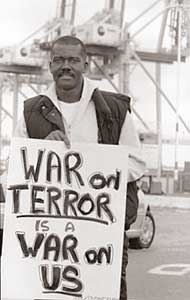On the picket line
By
Sue Davis
Published Oct 18, 2007 10:39 PM
Drop the charges, say Longshore workers
|
Photo: TransportWorkers.org
|
“You ready to fight? Damn right!” was the chant outside the Yolo
County Superior Court in Woodland, Calif., on Oct. 4. More than 150 members of
Local 10 of the International Longshore and Warehouse Union as well as
community activists set up a picket line there to support unionists Aaron
Harrison and Jason Ruffin, who were being arraigned on charges of obstruction
of justice.
The two were arrested on Aug. 23 after port security demanded to search their
car when they returned to work after lunch. The two, who usually work at the
port in Oakland, asked to see the security guards’ identification and
called their union rep. After the West Sacramento police arrived, they dragged
the two from their car, sprayed them with mace, and arrested them for
trespassing and resisting arrest. The trespassing charge was subsequently
dropped.
“[The police] think they have the right to [rough up our members and mace
them],” Trent Willis, former ILWU Local 10 president, told the Woodland
Daily Democrat. (Oct. 4) “You have a clear case of police brutality and
racial profiling.” Community activists like Rev. Ashiya Odeye, director
of the Justice Reform Coalition, concurred. “But now [the police] have
made the mistake of doing this to members of a union.”
Lawyers for the workers requested a continuation of the arraignment until Oct.
22 to give them time to review the police report and other evidence.
Jack Heyman, Local 10 executive board member, warned that more protestors will
be there if the charges aren’t dropped. “We’re going to get
our people from San Francisco, Stockton and Oakland at the courthouse—and
if they’re here, they can’t be at the docks working.”
NLRB guts voluntary union recognition
The National Labor Relations Board was never set up to be a friend of labor,
though from time to time it has taken pro-worker stands. It’s been
particularly hostile to collective bargaining rights during the last seven
years of the Bush administration. A Sept. 29 ruling proves it.
The board ruled that if employers voluntarily recognize a union based on union
authorization cards (also known as card-check), anti-union employees have a
45-day window to petition for an NLRB decertification election. The ruling
stipulates that 30 percent of employees can force an election even though more
than 50 percent of the workers want the union and even if a bargaining
agreement has been reached during the 45-day period. (AFL-CIO blog, Oct. 3)
In a dissenting statement, two NLRB members noted the ruling “cuts
voluntary recognition off at the knees” and “subjects the will of
the majority to that of a 30 percent minority.”
No to ‘no-match’ rules
On Oct. 10 a federal judge in San Francisco ordered an “indefinite
delay” to implementation of draconian “no-match” rules. The
New York Times called the Department of Homeland Security rules “a
central measure of the Bush administration’s new strategy to curb”
undocumented workers. (Oct. 11)
Even though the initial lawsuit was brought by labor and civil rights groups to
defend workers’ rights, the bosses, headed by the U.S. Chamber of
Commerce, opposed the rules for very different reasons.
“Judge Breyer chastised the Department of Homeland Security for making a
policy change with ‘massive ramifications’ for employers, without
giving any legal explanation or conducting a required survey of the costs and
impact for small businesses,” wrote the Times. It also reported
“the rule could lead to the firing of many thousands of legally
authorized workers, resulting in ‘irreparable harm to innocent workers
and employers.’”
Stopping implementation of this rule, which could have led to the firing of up
to 8.7 million workers due to inaccurate Social Security records, is a win for
all workers. But it’s only a temporary victory. Brutal workplace raids,
jailing of undocumented and documented workers alike, and deportations that
split up families continue. So the struggle to defend workers’ rights,
especially those of immigrant workers, must continue.
Articles copyright 1995-2012 Workers World.
Verbatim copying and distribution of this entire article is permitted in any medium without royalty provided this notice is preserved.
Workers World, 55 W. 17 St., NY, NY 10011
Email:
[email protected]
Subscribe
[email protected]
Support independent news
DONATE


